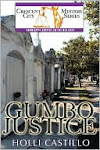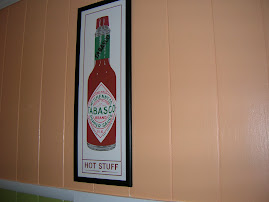Two weeks ago I changed a character's name in my current project, Jambalaya Justice, the second in the Crescent City Mystery Series and followup to Gumbo Justice. The character is a featured character in the novel, and I've had him named for four years, when I first started writing the book.
I started writing Jambalaya Justice while I waited to find a publisher for Gumbo Justice. Then Katrina hit, and I stopped writing Jambalaya briefly and began working on Chocolate City Justice, a novel that would take my protag through the hurricane. At that time I didn't have a contract for Gumbo Justice, and my thought was to make Chocolate City the first in the series, and then rewrite Gumbo to be the second, figuring it might be easier to sell. Before I got too far into Chocolate City, Oak Tree Press offered me a contract for Gumbo Justice, so I went back to the original plan, and decided to make Chocolate City the third book. But I digress- the point is, I named one of my detectives years ago, but changed his name because I read a novel that had a character, another cop, with the same name.
If the name had been John or Mark or something ordinary, I wouldn't have worried about it, but it was a nickname a bit off the beaten path. The other problem was the book was written by a writer with my publisher, so I'm pretty sure a lot of the same people who read his book would read mine, and it would look like I stole his character's name. It may seem like it shouldn't matter, but it does to me, so I changed it. Fortunately, my husband is good with helping me name characters, so I ended up with something just as good if not better.
I also had an occasion where I read a blog where comments centered around a new cop show, Rookie Blue, and how some people thought one of the undercover operations the police were doing was unrealistic. I had some concern, because my characters were doing a similar undercover operation. I ended up watching the show they were discussing, catching the episode on my computer, and as it turned out, the undercover work in the show was different than what I had written. I also ended up loving the show, and it's now my favorite. But I did have that moment of worry.
I like to read other novels set in New Orleans for comparison purposes. Some I've read are terrible, and it's clear the writer doesn't live here or know that much about the city--small things like not knowing we have interstates instead of freeways, or that our police department handles criminal cases while our sheriff's department works in the jail. . I've also read some really good novels set here. Recently I downloaded a sample of a James Lee Burke novel on my Kindle, because he seems to be the big one people always bring up when they find out I write about New Orleans.
I only wanted to read a few pages, to get a feel for his writing. Within a page or two I discovered the novel seems to be about murdered hookers. Alarms went off in my head, because Jambalaya Justice is about murdered hookers. Now I feel like buying the book to make sure what I'm writing isn't too similar to what he already wrote, but I don't really have time to read right now. Also, while he is definitely authentic, his style is not one that I would ordinarily choose to read. I like to get to the story fast, I like action, a setting designed to move the plot along, not as a separate entity. His writing is more poetic, and extremely descriptive, designed more to create mood and ambiance than to quickly get to the meat and potatoes. It's a difference in style choice, I'm certainly not criticizing his writing.
So my new decision is just to quit reading when I'm writing. I can't keep changing things because someone else may have written about it, and if I don't know about what other people wrote, I really shouldn't have to worry about the novels being too similar to each other.
Of course, some new worry will just replace the old, but hopefully it will be something that doesn't have me rewriting.
Tuesday, September 28, 2010
Saturday, September 11, 2010
Book drawing winner
Margaret from Illinois won the book drawing for Gumbo Justice in a random drawing of everyone who left comments on the Katrina blogs. Thanks everyone for reading!
Labels:
Gumbo Justice,
Hurricane Katrina
Wednesday, September 1, 2010
Hurricane Katrina Anniversary- Part 3
This is the last segment of the Hurricane Katrina Anniversary. If you post a comment on any of my Katrina blogs, you will be entered in a drawing for a signed copy of Gumbo Justice. I will be doing the drawing over the weekend, and will post the winner then.
Katrina Anniversary Bog- Part 3
Two close friends of mine stayed in New Orleans for the hurricane, coincidentally, each the Godfather of one of my daughters. Both had very different experiences.
Danny stayed at his house in mid-city. His house was raised, and didn’t flood. After a few days without electricity, he would have left, but an elderly neighbor who lived around the corner from him refused to leave, and he wouldn’t leave her behind. The police and National Guard tried to strong arm him into leaving, but he had provisions and was happy to stay and watch over his belongings and his neighbor. He ventured out frequently. With no electricity, it was the darkest dark he had ever seen. Gunshots were frequent. Occasionally, bodies floated by, including one in a police uniform. There was little to be done with no phone service, no way for police to retrieve the bodies, and no place to put the bodies until they could be carted away for autopsy.
Robbie also stayed behind, in his house in Lakeview, on Canal Boulevard, a street name that would prove to be appropriate after the 17th Street Canal failed. Robby, like Danny, had the means to leave. Unlike Danny, Robbie didn’t have a neighbor to look out for, but did have a cat, and cats weren’t welcomed at shelters or most motels. When Robbie’s house began filling with water, the first thing he did was grab his cat and put her in a cat carrier. He ended up swimming back and forth in his driveway with the cat carrier over his head, until he finally made it to a set of raised railroad tracks.
From the tracks, he tried to retrieve his furniture, now floating past him. He managed to save a few pieces and put them on the tracks, but it was pointless. He ended up leaving it all behind anyway. He also saw people floating by, screaming for help, beginning to drown. He tried to help them, but they were too far away from the tracks, and there was nothing he could do. He ended up making a very long trek to the Superdome, through water up to his chest, holding his cat above his head.
Outside the Superdome, he was greeted by an eerie sight- a line of cats and dogs, sitting and staring, confused, waiting to be retrieved by their hopeless owners who felt forced to leave them behind. When he tried to enter the dome, he was told he could not bring his cat in, nor would he be allowed to bring her with him when the buses showed up to evacuate people. So he left, and went to Danny’s, not prepared to relegate his Fluffy to that line of sad, abandoned cats and dogs waiting for masters who would never come back for them.
Danny’s elderly neighbor eventually agreed to leave, and when she did, Danny left as well. The safety issues were less important to him than the comfort issues, and he was ready for civilization again. He managed to contact someone by text message to meet him on the interstate, and he walked. Robby also eventually met up with his family in Baton Rouge, where he spent some time in the hospital, covered with boils from a staph infection he caught from the flood waters. He was one of many treated for what they were terming Katrina rash.
I returned home exactly 2 weeks after the hurricane to minor roof damage, with working electricity and water service. Phone service and cable took a little longer, but we got them back pretty quickly. I was more isolated back home with no t.v. or cable for a few days than I had been in Houston, and it was an uneasy time. Only a few men in our neighborhood had returned, and had not brought their families back yet, and my two girls and I were pretty much alone all day while my husband, a contractor, supervised a team from Texas repairing roofs. There was a silence like I had never experienced. Ours was the only air-conditioner running, and then when the cable service was restored, the only t.v.. We had to drive two hours to Thibodeaux to find a grocery that was stocked with meat and other freezer foods, and where we didn’t have to wait in line an hour just to get in the door.
The smell was sometimes overwhelming, whether from moldy refrigerators, the rotten food everyone had to bury in their backyards, the stagnant water that had yet to drain from some neighborhoods, or the corpses that had yet to be removed from the flood. Flies the size of small birds came from nowhere, but were particularly nasty at the gas stations for some reason. Gas was another thing we had to wait in line for, and it was a good idea not to go anywhere if you couldn’t gas up near home, because you never knew if gas would be available at the next station. Debris was still a danger, clogging the streets and puncturing tires, and power lines were still down in many areas.
Driving around the un-flooded sections of town was odd. Very few cars on the roads, curfew at dark, and near the area of the breach, the streets were gone, the houses either destroyed or moved by the wall of water. Where streets once sat was nothing but sand. An occasional street sign had not been destroyed, and provided a vague landmark. Houses were crushed, others sat in the middle of what had once been the street.
Stories of shootings and rapes were still prevalent. Some of these were certainly tall tales, or exaggerated versions of true stories, but some of the stories were true, and were covered up, or at least denied to the media. One particularly sad and chilling story was of local icon, Charmaine Neville. She ended up commandeering a bus and driving a busload of people out of the city after the flood, but not before saving herself and a neighbor from the rising waters only to be raped by a stranger trying to get to higher ground. She is certainly not alone in her tragedy.
It should come as no big surprise that mental health issues increased, exacerbated by the fact that most of the mental health facilities either did not reopen, or were closed down after they did because of lack of funding. Murder/suicides also increased, especially domestic.
I definitely didn’t have it as bad as some people, although my way of life was affected. I relied upon public assistance for the first time in my life, receiving food stamps for a two month period as well as a check from Red Cross, something I never would have thought I would need to do. While my credit card companies would wait for payment, the bank for my mortgage and car note expected any shortage to be made up in the next three months, as opposed to tacking the missing payment on at the end of the loan. Why they thought any of us would be in a position to pay extra in the coming months, when many people were out of jobs, is beyond me, but it wasn’t worth not paying it now if I could, instead of having to find extra money a month from now. Not knowing what the future was going to hold, I didn’t want to take the chance. So my Red Cross check went to bills and the groceries were paid for, so until my husband actually got paid– some people needed to wait for insurance claims to pay him– we made due. Unlike most of Louisiana, for some reason FEMA denied me payment. I must have filled out the forms wrong on the internet, but I helped my mother fill hers out and she received her money without a problem, so I’m not sure what happened.
Katrina was definitely a shock to all of us, but we tend to focus on all the bad things that happened– the lack of government reaction, the way some of our police turned into murderers, the way some of our citizens stole big screen t.v.’s on National Television. As a city, we have a lot to be ashamed of.
On the other hand, the good stories don’t make the papers. For every thug who looted a store for a gun, there is a decent person who pulled a stranger from raging flood waters. For every cop who shot an unarmed person in error, there is one who saved a baby from a roof. And for every doctor who overdosed a terminal patient on morphine, there is a guy who refused to leave until he made sure his neighbor was safe.
Ultimately, if you view the lowest point in the life of any person or any city as a tragedy unfolds, you’re going to see a lot of ugly. Hopefully, those who actually experienced it will be able to show the good as well. And God forbid if such a scenario repeats itself, we will all know what to do next time.
Holli Castillo
Katrina Anniversary Bog- Part 3
Two close friends of mine stayed in New Orleans for the hurricane, coincidentally, each the Godfather of one of my daughters. Both had very different experiences.
Danny stayed at his house in mid-city. His house was raised, and didn’t flood. After a few days without electricity, he would have left, but an elderly neighbor who lived around the corner from him refused to leave, and he wouldn’t leave her behind. The police and National Guard tried to strong arm him into leaving, but he had provisions and was happy to stay and watch over his belongings and his neighbor. He ventured out frequently. With no electricity, it was the darkest dark he had ever seen. Gunshots were frequent. Occasionally, bodies floated by, including one in a police uniform. There was little to be done with no phone service, no way for police to retrieve the bodies, and no place to put the bodies until they could be carted away for autopsy.
Robbie also stayed behind, in his house in Lakeview, on Canal Boulevard, a street name that would prove to be appropriate after the 17th Street Canal failed. Robby, like Danny, had the means to leave. Unlike Danny, Robbie didn’t have a neighbor to look out for, but did have a cat, and cats weren’t welcomed at shelters or most motels. When Robbie’s house began filling with water, the first thing he did was grab his cat and put her in a cat carrier. He ended up swimming back and forth in his driveway with the cat carrier over his head, until he finally made it to a set of raised railroad tracks.
From the tracks, he tried to retrieve his furniture, now floating past him. He managed to save a few pieces and put them on the tracks, but it was pointless. He ended up leaving it all behind anyway. He also saw people floating by, screaming for help, beginning to drown. He tried to help them, but they were too far away from the tracks, and there was nothing he could do. He ended up making a very long trek to the Superdome, through water up to his chest, holding his cat above his head.
Outside the Superdome, he was greeted by an eerie sight- a line of cats and dogs, sitting and staring, confused, waiting to be retrieved by their hopeless owners who felt forced to leave them behind. When he tried to enter the dome, he was told he could not bring his cat in, nor would he be allowed to bring her with him when the buses showed up to evacuate people. So he left, and went to Danny’s, not prepared to relegate his Fluffy to that line of sad, abandoned cats and dogs waiting for masters who would never come back for them.
Danny’s elderly neighbor eventually agreed to leave, and when she did, Danny left as well. The safety issues were less important to him than the comfort issues, and he was ready for civilization again. He managed to contact someone by text message to meet him on the interstate, and he walked. Robby also eventually met up with his family in Baton Rouge, where he spent some time in the hospital, covered with boils from a staph infection he caught from the flood waters. He was one of many treated for what they were terming Katrina rash.
I returned home exactly 2 weeks after the hurricane to minor roof damage, with working electricity and water service. Phone service and cable took a little longer, but we got them back pretty quickly. I was more isolated back home with no t.v. or cable for a few days than I had been in Houston, and it was an uneasy time. Only a few men in our neighborhood had returned, and had not brought their families back yet, and my two girls and I were pretty much alone all day while my husband, a contractor, supervised a team from Texas repairing roofs. There was a silence like I had never experienced. Ours was the only air-conditioner running, and then when the cable service was restored, the only t.v.. We had to drive two hours to Thibodeaux to find a grocery that was stocked with meat and other freezer foods, and where we didn’t have to wait in line an hour just to get in the door.
The smell was sometimes overwhelming, whether from moldy refrigerators, the rotten food everyone had to bury in their backyards, the stagnant water that had yet to drain from some neighborhoods, or the corpses that had yet to be removed from the flood. Flies the size of small birds came from nowhere, but were particularly nasty at the gas stations for some reason. Gas was another thing we had to wait in line for, and it was a good idea not to go anywhere if you couldn’t gas up near home, because you never knew if gas would be available at the next station. Debris was still a danger, clogging the streets and puncturing tires, and power lines were still down in many areas.
Driving around the un-flooded sections of town was odd. Very few cars on the roads, curfew at dark, and near the area of the breach, the streets were gone, the houses either destroyed or moved by the wall of water. Where streets once sat was nothing but sand. An occasional street sign had not been destroyed, and provided a vague landmark. Houses were crushed, others sat in the middle of what had once been the street.
Stories of shootings and rapes were still prevalent. Some of these were certainly tall tales, or exaggerated versions of true stories, but some of the stories were true, and were covered up, or at least denied to the media. One particularly sad and chilling story was of local icon, Charmaine Neville. She ended up commandeering a bus and driving a busload of people out of the city after the flood, but not before saving herself and a neighbor from the rising waters only to be raped by a stranger trying to get to higher ground. She is certainly not alone in her tragedy.
It should come as no big surprise that mental health issues increased, exacerbated by the fact that most of the mental health facilities either did not reopen, or were closed down after they did because of lack of funding. Murder/suicides also increased, especially domestic.
I definitely didn’t have it as bad as some people, although my way of life was affected. I relied upon public assistance for the first time in my life, receiving food stamps for a two month period as well as a check from Red Cross, something I never would have thought I would need to do. While my credit card companies would wait for payment, the bank for my mortgage and car note expected any shortage to be made up in the next three months, as opposed to tacking the missing payment on at the end of the loan. Why they thought any of us would be in a position to pay extra in the coming months, when many people were out of jobs, is beyond me, but it wasn’t worth not paying it now if I could, instead of having to find extra money a month from now. Not knowing what the future was going to hold, I didn’t want to take the chance. So my Red Cross check went to bills and the groceries were paid for, so until my husband actually got paid– some people needed to wait for insurance claims to pay him– we made due. Unlike most of Louisiana, for some reason FEMA denied me payment. I must have filled out the forms wrong on the internet, but I helped my mother fill hers out and she received her money without a problem, so I’m not sure what happened.
Katrina was definitely a shock to all of us, but we tend to focus on all the bad things that happened– the lack of government reaction, the way some of our police turned into murderers, the way some of our citizens stole big screen t.v.’s on National Television. As a city, we have a lot to be ashamed of.
On the other hand, the good stories don’t make the papers. For every thug who looted a store for a gun, there is a decent person who pulled a stranger from raging flood waters. For every cop who shot an unarmed person in error, there is one who saved a baby from a roof. And for every doctor who overdosed a terminal patient on morphine, there is a guy who refused to leave until he made sure his neighbor was safe.
Ultimately, if you view the lowest point in the life of any person or any city as a tragedy unfolds, you’re going to see a lot of ugly. Hopefully, those who actually experienced it will be able to show the good as well. And God forbid if such a scenario repeats itself, we will all know what to do next time.
Holli Castillo
Labels:
cats and dogs,
guns,
Holli Castillo,
Hurricane Katrina,
looting,
New Orleans
Subscribe to:
Posts (Atom)







